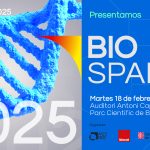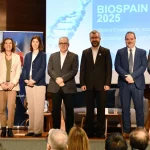BIOSPAIN 2025: The Role of the Biotechnology Industry in the EU’s Strategic Autonomy
- Europe’s ability to develop biotech solutions is crucial to securing its economic and strategic future.
- Under the motto “Global crossroads, local vibes”, the event aims to connect local talent with European and American ecosystems.
- BIOSPAIN 2025 will feature the Green Innovation Forum, a dedicated space for companies in the agricultural, food, and industrial biotechnology sectors
AseBio and Biocat, in collaboration with the Generalitat of Catalunya and the Barcelona City Council, presented the latest updates on BIOSPAIN 2025 in a press conference on Tuesday. In addition to outlining the program of the largest national biotechnology event—also a major international reference—discussions focused on how Europe can strengthen its biotech sovereignty, the policies needed to drive it forward, and the importance of public-private partnerships, among other topics.
Under the theme “Global crossroads, local vibes,” BIOSPAIN 2025 reaffirms its mission to connect Spanish biotechnology with the global stage while valuing local talent and richness. Rocío Arroyo, President of AseBio, emphasized BIOSPAIN’s role as a catalyst for investment and innovation in the sector: “BIOSPAIN 2025 not only strengthens its position as a benchmark event in Spain’s biotech landscape but also takes a step forward toward becoming a major European hub. This year’s theme reflects our goal to project our ecosystem internationally while celebrating the dynamism and talent of our local environment. This edition will be key to understanding the sector’s biggest challenges—from research to the commercialization of disruptive innovations—and how these challenges drive us to seek collaborative and sustainable solutions.”
The Role of Biotechnology in the EU’s Strategic Autonomy
One of the core topics of the presentation was the panel “The Role of the Biotechnology Industry in the Challenge of the EU’s Strategic Autonomy,” moderated by Ion Arocena, AseBio’s CEO. The session highlighted that, in a globalized world marked by health crises, supply chain disruptions, and fierce tech competition, Europe urgently needs to innovate and lead in key sectors such as healthcare, agri-food, and bioeconomy.
Panelists included Carles Fàbrega, Managing Director of HIPRA Human Health; Isabel Portero, CEO of Biohope; and Marina Pollán, Director of the Carlos III Health Institute (ISCIII). They discussed how biotechnology can help strengthen the EU’s autonomy, especially through the production of disruptive technologies—crucial for industrial resilience and European leadership in innovation.
HIPRA specifically called for a stable and more agile European regulatory framework to boost the biotech sector’s innovation and competitiveness. “We need predictable regulation and better EU coordination to scale innovation and strengthen industrial capacity,” said Carles Fàbrega. HIPRA will present its new business unit, HIPRA Biotech Services, along with its advances in vaccines and biological products at BIOSPAIN 2025. “We want BIOSPAIN to be a platform to promote strategic collaborations and showcase the potential of Spanish biotech,” he added. He also stressed that “the vaccine industry must be on the political agenda; it is key for healthcare autonomy and the creation of quality jobs.”
Marina Pollán, Director of ISCIII, stated: “BIOSPAIN is a key meeting point for biotechnology, nationally and internationally. This year, our institute will again play an active role, promoting the transfer of scientific knowledge with real health impact—because only when translational health research turns into tangible solutions can we truly transform and save lives.” ISCIII will participate with its innovation ecosystem—CIBER Consortium, CNIO Foundation, and ITEMAS Platform—and present its programs to bring technologies with industrial potential closer to the market, along with strategies to improve the transfer of funded research projects. “BIOSPAIN will also help us continue building connections with companies and fostering public-private synergies within the Horizon Europe framework. All these initiatives reflect our strong commitment to biotech innovation and its applications in healthcare.”
Isabel Portero remarked that BIOSPAIN is a key forum for all players aiming to carry out applied research that leads to innovative products. “It should not be seen solely as a forum for companies, but for anyone wanting to pursue applied biotech research in this country,” she noted. Portero highlighted that Biohope has reached several important collaborations thanks to BIOSPAIN.
Finally, Robert Fabregat, Director General of Biocat, stated: “The European biotech industry is facing major challenges—from accelerating the arrival of advanced therapies and disruptive solutions in health, agri-food, and sustainability, to adapting to a shifting regulatory environment and an uncertain geopolitical context, as well as integrating emerging technologies like AI and synthetic biology. BIOSPAIN 2025 is not just a unique setting for these discussions, but also a gateway to new international collaboration, investment access, and technology transfer opportunities. The event further reinforces our commitment to promoting strategic alliances that help Europe advance toward technological and health autonomy, placing innovation at the core of competitiveness and social well-being.”
A Program Focused on the Sector’s Biggest Challenges
BIOSPAIN 2025 will feature around 60 sessions addressing the latest developments in genomics, gene editing (CRISPR), cancer therapies, immunotherapy, and synthetic biology. The impact of artificial intelligence in clinical research, biotechnology applied to regenerative agriculture, and the European regulatory context surrounding New Genomic Techniques and pharmaceutical legislation will also be covered.
Additionally, BIOSPAIN will provide a prime networking space, offering opportunities to connect with companies, research centers, institutions, and investors from Spain and abroad. The 2025 edition aims to surpass the record numbers of the 2023 edition in Barcelona, which brought together over 2,200 attendees from nearly 1,000 companies across 34 countries, generating over 5,000 one-to-one meetings.
Green Innovation Forum at BIOSPAIN
BIOSPAIN 2025 will host the Green Innovation Forum, a dedicated space for companies in the agricultural, food, and industrial biotechnology sectors (green biotech). This forum is a unique opportunity to showcase biotechnology’s value as a key tool in transitioning toward a sustainable, carbon-neutral, and eco-friendly economy.
This year, BIOSPAIN is committed to providing a differentiated area where green biotech companies can display their capabilities, products, and services, and create synergies among key players in an emerging and promising sector. The partnering platform will allow companies to schedule meetings and present innovative projects.
The Green Innovation Forum at BIOSPAIN will include a full agenda of discussions and roundtables focused on the most relevant topics in biotech and the green economy, exploring medium- and long-term solutions to challenges such as climate change, industrial transformation, sustainable food systems, and the development of bioproducts.
BIOSPAIN 2025 will take place from October 7 to 9 in Barcelona, the biotech capital of Spain and one of Europe’s leading health innovation hubs. Following its success as host city in 2023, Barcelona has also been confirmed as the venue for the 2027 and 2029 editions.
Ángel Luis Jiménez
Communication Director
662 172 126
ajimenez@asebio.com
AseBio brings together 300 entities and represents the entire Spanish biotechnology sector. Its mission is to lead the transformation of the country by positioning science, innovation, and especially biotechnology as drivers of economic growth and social well-being. Among its members are companies, associations, foundations, universities, technology centers, and research institutions that directly or indirectly engage in biotechnology-related activities in Spain.






